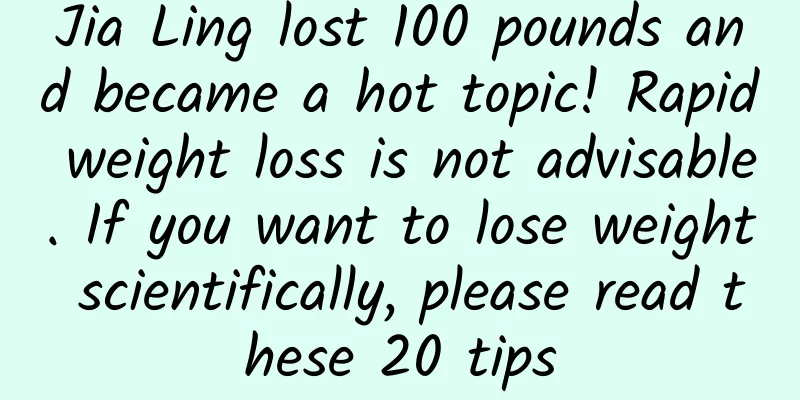Jia Ling lost 100 pounds and became a hot topic! Rapid weight loss is not advisable. If you want to lose weight scientifically, please read these 20 tips

|
The first big shock of 2024! Jia Ling lost 100 pounds Hot topics discussed on the Internet That's 100 jin. What about fat loss? One's own failure is terrible But the success of others is even more worrying! There are some people I am obviously very thin but I always say I am fat I still shout about losing weight every day Only the real "Ban Yue" has the right to speak! obesity Recognized as a disease by the World Health Organization What is considered fat? Body Mass Index (BMI) Overweight adults: BMI ≥ 24.0 kg/m2 Adult obesity: BMI ≥ 28.0 kg/m2 Health hazards of central obesity Greater than general obesity Criteria for diagnosing central obesity in adults Adult female waist circumference ≥ 85cm Adult male waist circumference ≥ 90cm Obesity is really harmful obesity A major risk factor for non-communicable diseases It has become a serious social health problem Image source: Health World Although overweight and obesity are harmful But blindly losing weight is not advisable 100 pounds is very inspiring But in the process of weight loss If you don't pay attention, you will "turn over" Short-term weight loss → long-term harm! ① People lose weight and anorexia comes Losing weight quickly in a short period of time may lead to anorexia nervosa, which can cause endocrine disorders and severe malnutrition, leading to a series of medical complications. ② “Age Flo” disappears! For women, rapid weight loss in a short period of time may also cause menstrual disorders or even amenorrhea. ③ Not eating carbohydrates will harm your liver Carbohydrates are not a disaster, they are essential to us. Not eating carbohydrates for a long time may cause a large amount of fat to accumulate in the liver, which may then develop into fatty liver. ④ You will become bald if you keep losing weight Many people who diet to lose weight may suffer from malnutrition. Deficiency of nutrients such as iron, vitamin B3, vitamin D, fatty acids, and selenium may cause hair loss. ⑤Replacing meals every day puts a lot of pressure on the heart Eating meal replacements for a long time will affect heart function and may cause palpitations, shortness of breath, angina pectoris, and even cardiac arrest. Quick look! 20 scientific ways to lose weight! The first step to lose weight is to control your diet, increase physical activity, and achieve a negative energy balance. The second approach uses comprehensive lifestyle management, including diet, exercise, and behavioral interventions. Article 3: On the basis of controlling total calories, adhering to a balanced diet pattern based on cereals is conducive to weight loss; daily meals should include cereals and potatoes, vegetables and fruits, livestock, poultry, fish, eggs, milk and legumes, and reduce the intake of oil, salt and sugar. Article 4: Properly increasing the intake of milk and its products in the diet can help lose weight. The Dietary Guidelines for Chinese Residents (2022) recommends that each person consume 300-500g of liquid milk or equivalent amount of dairy products per day. Article 5: Controlling total calories and changing the ratio of the three major energy-supplying nutrients (low carbohydrates, low fat, high protein, etc.) in the diet pattern can have a short-term weight loss effect, but the long-term effect is not obvious and is not recommended for long-term use. Article 6: A low-carbohydrate diet is beneficial for short- to medium-term weight control. The use of a ketogenic diet for weight loss must be conducted under the guidance of a doctor. Article 7: Eating at night and skipping breakfast increase the risk of obesity and are not conducive to weight loss. Article 8: Slowing down the speed of eating is conducive to restoring and maintaining a healthy weight. It is recommended that adults eat for more than 20 minutes per meal. Article 9 There is no clear scientific evidence to prove the weight loss effect of natural dietary supplements, so they should be used with caution. Article 10: Aerobic, resistance and high-intensity interval exercises can all effectively reduce weight. Article 11: Maintaining moderate-intensity exercise > 250 minutes per week can help lose weight, and higher-intensity exercise has a more obvious weight loss effect. Article 12: Sleeping for less than 6 hours a day increases the risk of obesity, while sleeping for more than 7 hours a day is beneficial for weight loss, especially for preventing abdominal obesity. Article 13: Long-term and continuous psychological stress can increase the risk of obesity. Maintaining a good mental and emotional state can help maintain a healthy weight. Article 14: Mindfulness and looking in the mirror help restore a healthy weight. Article 15 Acupuncture therapy combined with lifestyle management can help with weight loss. Article 16: For patients who are overweight/obese and have complications of "three highs" and still cannot lose weight effectively after 3 to 6 months of lifestyle intervention, drug treatment may be considered. Article 17: Surgical treatment of obesity is effective and is suitable for people with severe obesity who have not responded to lifestyle interventions. Article 18 The goal of weight intervention for overweight/obese children is to maintain weight or slow down the weight gain, and eventually reach a healthy weight, rather than necessarily reducing absolute weight. Lifestyle intervention is the first approach, and the participation of parents and families is crucial. Article 19: Overweight/obese children should focus on adjusting their dietary structure, reduce eating out, and control their eating speed, snacks, and sugary drinks. They should eat more fruits and vegetables; drink at least 300ml of milk or an equivalent amount of dairy products every day; reduce the frequency of eating out, eat less quickly, and control each meal time to 20-30 minutes. Article 20: Overweight/obese children should engage in at least 150 minutes of moderate to high-intensity aerobic exercise and resistance training per week, reduce sedentary periods, and use electronic devices for no more than 2 hours per day. |
<<: When doing nebulization at home, these precautions cannot be ignored!
>>: Laba, I wish you all the best
Recommend
Is there any conservative treatment for ectopic pregnancy?
Ectopic pregnancy is also called extrauterine pre...
What to do if you get pregnant after removing the IUD
We all know that the purpose of having an IUD is ...
Why does pregnant women have low blood sugar levels?
Women may experience many symptoms during pregnan...
What causes women to have dark circles under their eyes?
Dark circles are a common facial skin phenomenon,...
Moderate aging is coming, and comprehensive prevention and control of chronic diseases is no small matter
October 23 is the traditional Double Ninth Festiv...
Can I fly when I am one month pregnant?
Nowadays, people choose to travel by plane, which...
How long after ovulation does fertilization occur?
Many people wish to have a healthy baby after mar...
What happens when hard bumps grow on pubic hair?
Many female friends do not pay attention to perso...
How long does it take for breasts to start growing during pregnancy?
During pregnancy, changes in male hormones and ot...
How is Bacterial Vaginitis Caused?
There are many types of bacteria that can infect ...
Does a three-month miscarriage hurt?
It is very common for women to have abortions. So...
Tissue discharge on the seventh day after medical abortion
Compared with surgical abortion, medical abortion...
Top 10 nourishing foods for women in spring
Introduction: Food is a magical thing. If you eat...









